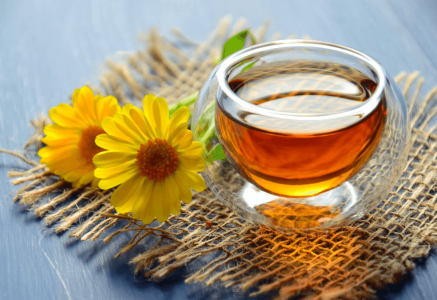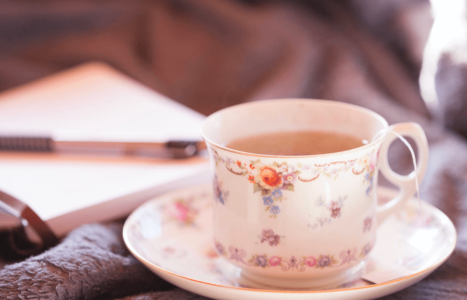You won't believe the icky fact Dr Karl revealed about tea bags
- Replies 25
Dr Karl Kruszelnicki is renowned for being one of Australia's leading scientists – but even we were left aghast after hearing one of his latest revelations about this everyday drink.
From English Breakfast to Green, there's nothing quite like a nice hot cup of tea to make us feel relaxed and calm. But before you reach for that tea bag, there's something you should know…
In a recent TikTok clip, the beloved scientist dropped a truth bomb about tea bags that has left many of us feeling a bit queasy.
Dr Karl informed viewers that, although we may not think about it when marvelling at their glossy packaging and fragrant smell, tea bags are actually still teeming with 'life'.
That's right - each tea bag can contain up to 400 bits of insect-based DNA!
'This is known as environmental DNA and can be left by something as simple as when an insect bites a tea leaf,' he said.
'This DNA is usually fairly fragile and can be destroyed by ultraviolet light and can be washed away by the rain.'
However, he added, if conditions are dark and dry (such as the inside of a tea bag), traces of the insect's DNA may still live on.
'Well, what does this mean?' he asked his followers.
'Firstly, there has been a push for people to eat insects instead of meat, and maybe we tea drinkers are part of that push,' he said jokingly. 'Secondly, tea fields are a hive of biodiversi-tea.'
Dr Karl has earned somewhat of a cult following on social media due to his candid and educational videos - not to mention his great personality and banter!
Needless to say, these revelations made a few tea drinkers do a double take. One person commented they would be switching to loose-leave tea, while someone else wrote, 'Dr Karl, stop blowing my mind!'


Sustainable Production of Tea
As awareness of the environmental impact of tea production has increased in recent years, many tea producers have turned to sustainable methods to reduce their ecological footprint.
These include implementing chemical-free fertilisers and pesticides, placing more emphasis on organic farming, and minimising water and energy usage throughout the production process.
Additionally, many tea estates have taken steps to protect wildlife habitats, ensuring that their activities do not disrupt the local ecosystem or inadvertently endanger wildlife.
This includes conservation projects and reforestation efforts, such as planting trees on tea estates and adjoining land, to improve long-term environmental health.
For those looking to enjoy their tea with a clear conscience, many companies offer organic or sustainably sourced tea options. This means the tea you're drinking has been produced in consideration of these environmental concerns and is certified to meet the highest sustainability standards.
So next time you're choosing a brewed beverage, make sure to grab a cuppa that's as good for the planet as it is for you.

As shocking as Dr Karl's revelation may be, it's important to remember that tea consumption has long been associated with a number of health benefits.
Various studies have demonstrated that drinking as little as two cups of tea a day can help reduce the risk of heart disease, protect against cognitive decline, reduce inflammation, and aid with weight loss.
Moreover, tea has been found to contain antioxidants, which are beneficial compounds that help to neutralise cell-damaging free radicals in the body, which can otherwise cause damage to the body's cells and molecular structures.
Not all the news about tea consumption is bad - the body of evidence supports that drinking tea can have positive benefits, especially when it is done in moderation.
So, members, what do you think of this information? Let us know in the comments section below!
From English Breakfast to Green, there's nothing quite like a nice hot cup of tea to make us feel relaxed and calm. But before you reach for that tea bag, there's something you should know…
In a recent TikTok clip, the beloved scientist dropped a truth bomb about tea bags that has left many of us feeling a bit queasy.
Dr Karl informed viewers that, although we may not think about it when marvelling at their glossy packaging and fragrant smell, tea bags are actually still teeming with 'life'.
That's right - each tea bag can contain up to 400 bits of insect-based DNA!
'This is known as environmental DNA and can be left by something as simple as when an insect bites a tea leaf,' he said.
'This DNA is usually fairly fragile and can be destroyed by ultraviolet light and can be washed away by the rain.'
However, he added, if conditions are dark and dry (such as the inside of a tea bag), traces of the insect's DNA may still live on.
'Well, what does this mean?' he asked his followers.
'Firstly, there has been a push for people to eat insects instead of meat, and maybe we tea drinkers are part of that push,' he said jokingly. 'Secondly, tea fields are a hive of biodiversi-tea.'
Dr Karl has earned somewhat of a cult following on social media due to his candid and educational videos - not to mention his great personality and banter!
Needless to say, these revelations made a few tea drinkers do a double take. One person commented they would be switching to loose-leave tea, while someone else wrote, 'Dr Karl, stop blowing my mind!'
Key Takeaways
- Dr Karl Kruszelnicki recently revealed that tea bags can contain DNA traces of up to 400 insects.
- These traces can be the result of an insect biting the tea leaves and can survive in the dry and dark environments found in tea bags.
- The discovery has shocked many, with some saying they will switch to loose-leaf tea instead.

The cultivation and consumption of tea have a rich history that spans many centuries and various continents. Credit: Pexels/Mareefe.
Sustainable Production of Tea
As awareness of the environmental impact of tea production has increased in recent years, many tea producers have turned to sustainable methods to reduce their ecological footprint.
These include implementing chemical-free fertilisers and pesticides, placing more emphasis on organic farming, and minimising water and energy usage throughout the production process.
Additionally, many tea estates have taken steps to protect wildlife habitats, ensuring that their activities do not disrupt the local ecosystem or inadvertently endanger wildlife.
This includes conservation projects and reforestation efforts, such as planting trees on tea estates and adjoining land, to improve long-term environmental health.
For those looking to enjoy their tea with a clear conscience, many companies offer organic or sustainably sourced tea options. This means the tea you're drinking has been produced in consideration of these environmental concerns and is certified to meet the highest sustainability standards.
So next time you're choosing a brewed beverage, make sure to grab a cuppa that's as good for the planet as it is for you.

Tea provides a lot of health benefits that offset the impact of hundreds of insect DNA. Credit: Pexels/Kim Van Vuuren.
As shocking as Dr Karl's revelation may be, it's important to remember that tea consumption has long been associated with a number of health benefits.
Various studies have demonstrated that drinking as little as two cups of tea a day can help reduce the risk of heart disease, protect against cognitive decline, reduce inflammation, and aid with weight loss.
Moreover, tea has been found to contain antioxidants, which are beneficial compounds that help to neutralise cell-damaging free radicals in the body, which can otherwise cause damage to the body's cells and molecular structures.
Not all the news about tea consumption is bad - the body of evidence supports that drinking tea can have positive benefits, especially when it is done in moderation.
So, members, what do you think of this information? Let us know in the comments section below!








